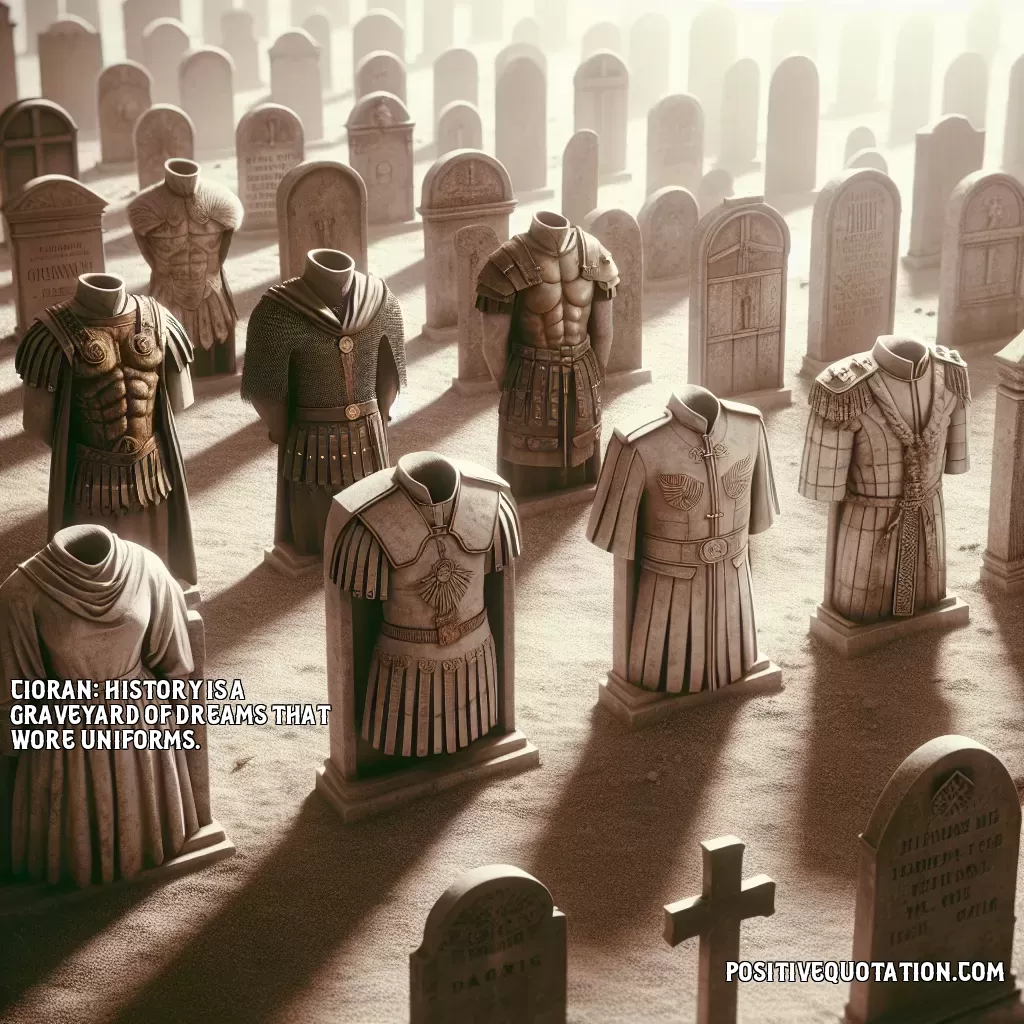
Cioran: History is a graveyard of dreams that wore uniforms.
Author: Emil Cioran
👁️ 6 views
Emil Cioran's quote, "History is a graveyard of dreams that wore uniforms," is a poignant reflection on the nature of human ambition, conflict, and the illusions that drive societies. In this metaphorical statement, Cioran suggests that history is littered with the remnants of ambitious dreams and ideologies that, over time, have been militarized and pursued through force. The term "graveyard" evokes imagery of death, finality, and the serene resting place of numerous pursuits that have come to an end. These are not just any dreams, but ones that have been formalized, structured, and disseminated through organized power — encapsulated in the phrase "wore uniforms." Uniforms are symbols of regimentation, authority, and collective identity within military and institutional contexts. They suggest that these dreams were not mere fantasies; rather, they were codified into doctrines, policies, and movements. Throughout history, numerous ideologies have morphed from idealistic visions into militarized quests. Whether through empires, revolutions, or national campaigns, these endeavors often start with grand visions of utopia, freedom, or superiority. However, as they become institutionalized and dictated by the incentives and limitations of their age, they may lead to wars, oppression, and ultimately, failure. Cioran's quote invites reflection on how easily noble ambitions can devolve when cloaked in the garb of authority and power. It serves as a cautionary tale about the potential destructiveness of dreams that rely on coercion to manifest their ideals, reminding us of the transient nature of such pursuits and the importance of questioning the motives behind grand societal dreams.
Quote By: Emil Cioran
Emil Cioran, a Romanian philosopher and essayist, was born on April 8, 1911, in Rășinari, a small village in Transylvania. Known for his profound and often pessimistic insights into the human condition, Cioran's work traverses themes of despair, existentialism, and the absurd. His early education in Sibiu and later in Bucharest laid the foundation for his literary and philosophical pursuits. In 1937, Cioran published his first book, "On the Heights of Despair," which quickly established him as a notable voice in Romanian literature.
After moving to Paris in 1937, Cioran embraced the French language and began writing in it, ultimately becoming a significant figure in French literature. His unique style marries lyrical prose with philosophical reflection, and his works often delve into the bleakness of human existence. In the tumultuous backdrop of the 20th century, Cioran’s writings resonate with the disillusionment and uncertainty of the era. He became associated with the existentialist movement, although he often disavowed its more optimistic philosophies.
Throughout his career, Emil Cioran produced several notable works, including "The Trouble with Being Born," "A Short History of Decay," and "The temptation to exist." His writings are characterized by a deep, almost poetic exploration of themes such as suffering, mortality, and the futility of existence. Cioran’s philosophy, often steeped in nihilism, invites readers to confront the absurdity of life and the inevitability of death, prompting introspection on the nature of existence itself.
Despite his bleak outlook, Emil Cioran's influence extends beyond the confines of despair; he has inspired countless readers and thinkers with his incisive observations and stylistic brilliance. He lived in Paris until his death on June 20, 1995, leaving behind a legacy of philosophical insight that continues to captivate audiences around the world. Cioran remains a significant figure in literary and philosophical discussions, celebrated for his ability to articulate the complexities of the human experience.